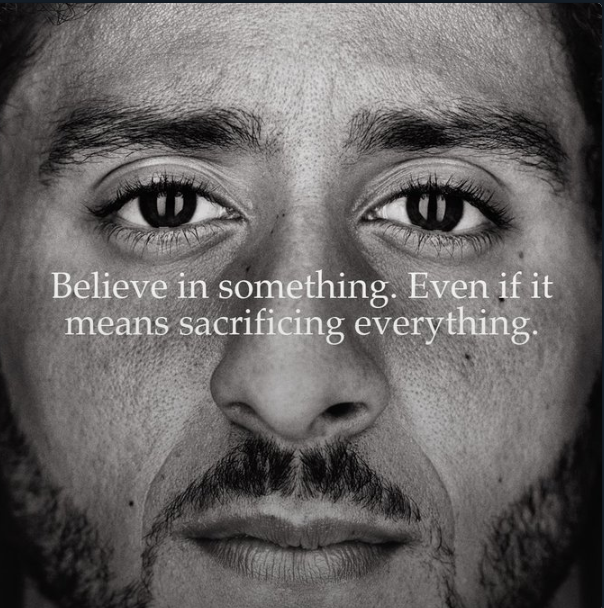Nike made headlines and sparked social media debate over the long Labor Day weekend with the reveal of its 30th anniversary “Just Do It” advertising campaign featuring NFL quarterback Colin Kaepernick.
Kaepernick posted the ad on his personal Twitter page on Monday (following an initial release from ESPN business reporter Darren Rovell) prompting an onslaught of outrage, support, and political debate surrounding Nike’s choice to partner with the controversial football star.
Kaepernick was first thrust into the public spotlight when the then-San Francisco 49ers quarterback kneeled during the National Anthem in 2016. The move was in protest of racial issues and police brutality. The protest started a national movement, with opinions from both sides of the aisle. A string of other NFL players followed suit, kneeling in support of Kaepernick. In Oct. 2017, Vice President Mike Pence made headlines when he abruptly left after players took a knee during a 49ers-Colts game.
According to The New York Times, Kaepernick is currently locked in a court battle with the NFL over allegations of collusion to keep the quarterback off the field in light of the protests.
Nike’s history with brand activism
Nike tapping Kaepernick isn’t out-of-the-blue. Kaepernick and Nike had a prior endorsement deal, dating back to 2011. And Kaepernick isn’t the only athlete to make an appearance in their latest endeavor.
Serena Williams, another athlete invested in the campaign, made headlines earlier this month when the French Open banned Williams’ from wearing custom-made tennis attire. Who make the so-called “catsuit?” Nike.
The risk, and the reward
As we’ve written about before, there’s been an increased need for brands to jump into the politically-charged social climate of today. Last year, Patagonia made headlines with its “Our President Stole Our Land” campaign, which took direct aim at President Donald Trump’s decision to roll back provisions on federal-protected land in Utah. We’ve seen it in other cases too, with brands pulling advertising from Sean Hannity, and removing ties from celebrities and organizations under allegation during the rise of the #MeToo movement.
Nike isn’t new to taking a stand, either. They’ve been challenging the norm for years. In 2017, Nike made headlines for the release of their “Nike Pro Hijab,” geared toward Muslim women. The campaign was met with praise, as well as some backlash.
Taking a side doesn’t come without some controversy. There is a risk with drawing a line in the sand. Some took to social media with videos setting their Nikes on fire in protest of the deal (with the hashtag #NikeBoycott). Other athletes and influencers tweeted their support for the shoe brand:
Nike also took a hit on the market. According to The Street, Nike shares were 2.5 percent lower in the opening minutes of trading on Tuesday — the biggest decline the brand has seen since July 3.
But what does the Kaepernick deal mean for Nike, and for marketers?
The biggest issue when it comes to choosing the right celebrity to endorse your product is ensuring that your chosen spokesperson represents your brand in the best possible way. Nike chose to cross the line with a provocative partnership that immediately thrust the brand into the center of public discourse. They chose not to play it safe, regardless of the consequences. Either way, Nike’s new campaign is making headlines, without necessarily being off-brand, either. “Just Do It,” has been Nike’s slogan for the past three decades — perhaps with Kaepernick, they’re reinventing what that slogan means for the brand, in modern times.
The issue is still hot right now — only time will tell how Nike will fare in the months to come. Interestingly, Rovell put a poll out to his 2.03 million followers, asking them whether or not they would continue to buy Nike products following news of the endorsement deal.
“POLL RESULTS: 29% say Nike’s use of Colin Kaepernick make them want to buy more products, 21% say they are not less likely to buy,” Rovell tweeted.
Fifty percent said the campaign didn’t impact their decision at all.
What do you think of the new campaign? Let us know in the comments below!








